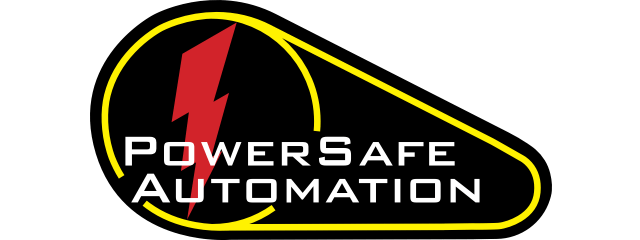Overview
A major electric-vehicle (EV) battery manufacturer partnered with a leading systems integrator to install a new high-speed conveyor line used to transfer battery modules between inspection, testing, and assembly stations. While the conveyor installation was completed successfully, the facility required an engineered tunnel guarding solution to ensure operator safety, support airflow and thermal considerations, and maintain strict quality and compliance standards.
PowerSafe Automation was selected to design, manufacture, and install a turnkey guarding system that would seamlessly integrate with the existing conveyor equipment and facility workflow—without interrupting production schedules.
Customer Challenge
After the systems integrator completed conveyor deployment, the battery plant team identified several key safety and operational challenges:
- Operators could access moving components during normal operation.
- No physical guarding existed to separate walkways from battery transfer zones.
- Visual inspection between process stations was required without compromising containment.
- Thermal event mitigation zones needed to remain unobstructed.
- Electrical and pneumatic distribution equipment needed accessible clearance inside the guarding footprint.
- Facility needed pre-designed service access panels for drives, gearboxes, disconnects, and controls.
- Enclosure design needed to align with applicable safety standards (OSHA, ANSI, ISO, NFPA).
The customer wanted a single turnkey partner to engineer, build, and validate a modular tunnel guard solution that would remain adaptable as production volumes and OEM equipment evolved.
PowerSafe Solution
PowerSafe Automation provided a full turnkey scope, including:
- Task-Based Risk Assessment (TBRA)
- On-site measurement of installed conveyor system
- 3D CAD modeling and fit-up verification
- Mechanical engineering + safety hardware specification
- Custom fabrication of T-slotted extrusion frames
- Panel sealing and dust management considerations
- UL-rated polycarbonate panel integration
- Integrated access points for mechanical and electrical service
- Controlled thermal-event relief pathways
- Installation, commissioning, and validation documentation
The solution reinforced the customer’s safety needs while supporting future conveyor changes and expansion.
Engineering + Design Detail
T-Slotted Aluminum Structure
PowerSafe used industrial-grade T-slotted aluminum extrusion to construct a rigid tunnel structure that allowed:
- Modular reconfiguration without cutting/welding
- Fast field installation
- Direct hardware mounting via T-channels
- Long-term structural stability despite differential floor conditions
Powder-coated and anodized options were offered based on environmental requirements.
Clear Polycarbonate Safety Panels
Optically clear, high-impact polycarbonate panels were selected to:
- Maintain visual line-of-sight to battery products and conveyors
- Contain debris or particulate
- Support clean-room compatible workflows
Panel thickness was determined per risk category and application environment.
Gap & Containment Planning
Battery manufacturing requires strict particulate containment. The guarding included:
- Targeted <3 mm gap sealing
- Brush and gasket materials around conveyor penetration
- Flush-mount panel interfaces
- Concealed extrusion corner joints
These features helped maintain product integrity and environmental control.
Thermal Event Escapement Strategy
Based on the TBRA, tunnel design included:
- Defined heat-release pathways
- Localized flame-resistant paneling
- Integration support for overhead ventilation
- No obstruction of OEM relief channels
These features ensured system safety while enabling proper thermal dissipation.
Access Doors & Maintenance Panels
To support preventative maintenance, the guard system included:
- Hinged side service doors
- Lift-off utility access panels
- Tool-less gear-drive access where permissible
- Secure padlock hasps for LOTO
- Optional interlocked doors for hazardous maintenance zones
These ensured rapid service without removing major guarding sections.
Electrical & Air Distribution Considerations
PowerSafe coordinated with plant engineering to properly integrate:
- Electrical disconnect access windows
- Junction box clearance zones
- Pneumatic panel access
- Conduit routing brackets
- Cable management channels
All guarding maintained NEC/NFPA clearance requirements.
Floor Mounting & Stability
Tunnel guard supports utilized:
- Leveling feet for uneven slab
- Anchor-ready base plates
- Structural reinforcement at forklift-adjacent areas
This provided rigid protection while allowing repositioning if conveyor layout changed.
Performance & Standards Compliance
The solution was designed to meet or exceed safety and production standards including:
- OSHA 1910.212 – Machine Guarding
- ANSI B11.19 – Guarding
- ISO 14120 – Guard Construction
- ISO 13849-1 – Functional Safety
- NFPA 70 / NFPA 79
- UL-recognized panels & components
PowerSafe supplied drawings, BOMs, validation documentation, and recommended maintenance procedures.
Installation & Commissioning
PowerSafe coordinated site access and commissioning to minimize downtime:
- Factory pre-assembly reduced install time
- Guarding installed around operational equipment
- Field modifications completed same-day to match conveyor
- Commissioning validated access panel functionality
- Documentation delivered to safety + maintenance teams
Total on-site installation was completed in 2.5 days, without interrupting existing production runs.
Results
Improved Operator Safety
- Physical barrier removed risk of accidental operator interaction with moving conveyors.
- Dust-tight sealing improved environmental control for battery process integrity.
- Polycarbonate panels allowed unrestricted visual oversight.
- Service panels reduced downtime for gearbox, drive, and distribution panel access.
- Guarding met OSHA, ISO, and ANSI requirements for guarding and access.
- T-slot structure supported modular replacement or expansion based on new EV models.
- Battery-process safety expertise
- Functional safety alignment (TBRA, PL requirements)
- Seamless collaboration with systems integrators
- Full turnkey delivery: design → build → install
- Field-ready support & documentation
- Ability to scale with future system changes
Eliminated Access Gaps
Inspection Visibility Preserved
Maintenance Access Improved
Standards Compliance Achieved
Future Adaptability
Customer Feedback
“PowerSafe delivered exactly what we needed—fast, clean installation that aligned with our conveyor footprint and plant standards. Their engineering team understood our safety and PM requirements and made integration seamless.”
Why PowerSafe Automation?
PowerSafe offers value beyond basic guarding:
The result: safer operators, more reliable uptime, and a cleaner, more professional production environment.
Conclusion
This project demonstrated PowerSafe Automation’s ability to engineer, manufacture, and install a customized tunnel guarding system around existing EV battery conveyor equipment—even after the primary line was installed.
By applying a safety-first approach with modular T-slot construction, polycarbonate panels, and integrated access for maintenance and utilities, PowerSafe helped the plant meet safety, compliance, and production goals—while preserving flexibility for future line expansion.
Next Steps
If your facility is installing new EV battery handling equipment or looking to improve the safety of an existing system, PowerSafe can support:
- Risk assessment
- Guarding system engineering
- Safety controls integration
- Fabrication
- Installation
- Validation



